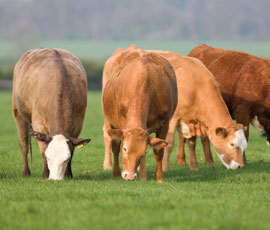Experts warn of increased risk of liver fluke

Livestock producers are being urged to be on their guard against liver fluke, as this year poses an even greater threat of disease.
Speaking to Farmers Weekly, experts warned that recent weather patterns meant the parasite had overwintered and animals were at “high risk” from the disease this autumn.
“We are currently in the biggest risk period. There’s a lot of fluke on pastures and when they migrate to the liver they cause mayhem,” says independent sheep consultant Lesley Stubbings.
“It is so bad this year that farmers have got to be on their guard.”
Chronic liver fluke infections can cause losses of £3 to £8/head in sheep, between £30 and £200/head in beef cattle and up to £240/head in dairy cattle, studies show.
The biggest risk period for liver fluke is normally between August and October, when levels of metacercariae – infective cysts – on pastures are at their highest.
But vet Matt Colston of Frame, Swift and Partners in Penrith says wet and warm conditions this summer have created the perfect conditions for fluke and as a result the risk could extend to January if conditions persist.
“The level of contamination will be so much higher than normal because there’s been no part where the weather has killed off stages of development,” explains Mr Colston.
The risk has been heightened yet again by the increased numbers of lambs left unsold on farms, which has put pressure on stocking densities.
Experts say those not normally at risk from liver fluke should now be alert to the fact they may have a problem this year.
“Eggs and snails may have washed down into normally drier areas and there could now be fluke in areas where we haven’t seen it before,” says Mr Colston.
“Don’t rely on what you’ve done before, because traditional drenching methods may not kill fluke this time around,” warns Ms Stubbings.
Instead she says producers need to assess the risks to their own stock.
“Follow animals through to the abattoir and get feedback on livers – that’s critical – and if you have unexpected deaths, get a post-mortem done.”
Mr Colston says pasture and grazing management is equally important and an essential part of fluke control.
He says producers should avoid high-risk pastures such as wet, boggy and poached fields where snail habitats – the intermediate hosts – are likely to be increased.
“Producers should strategically treat animals now and then in spring treat again to remove adult fluke,” Mr Colston advises.
Molly McKay of Norfolk Farm Vets says sheep are at the biggest risk from liver fluke compared with cattle.
“Sheep tend to get acute fluke and they will get very sick very quickly and die from it.
“If sheep producers know they have a problem they need to speak to their vet and treat straight away,” warns Ms McKay.
She says it is important for farmers to speak with their vet to discuss the best treatment to target the right stage of fluke.
“It is absolutely vital because we are already starting to see a some resistance and using products at the wrong time of the year will only perpetuate the problem.”
An over-reliance on the drug triclabendazole – which treats all stages of immature fluke – was reported in Farmers Weekly last week.
Speaking about triclabendazole, Ms Stubbings says it is critical that producers test for resistance of the drug before they decide to stop using it.
“We know that there is some resistance to triclabendazole. That means it is even more important that we get it right.
“If you know you’ve got resistance, you need to be using other things. But if you don’t know, you need to find out.”
For more information visit www.scops.org.uk
Top tips:
Avoid high-risk pastures
Quarantine treatments for incoming sheep and cattle is critical to minimise the risk of infection
Conduct faeces samples three weeks post-treatment to monitor efficacy
Always adhere to best practice and administer the correct dosage level to prevent resistance
Choose the right product for the right time and check withdrawal periods
Move animals to areas of low-risk post-treatment to avoid having to re-treat
Dose cattle at housing to prevent them from contaminating pasture during spring turn-out
More advice on fluke and worms
